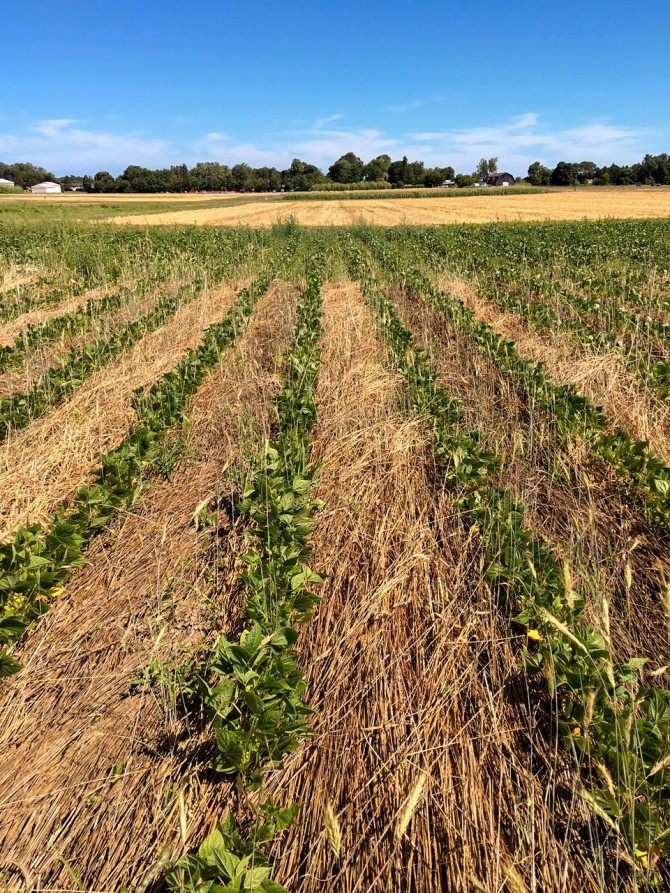$2M grant supports more sustainable path for organic farmers
By Erin Rodger
Organic field crop farmers in the Northeast and Upper Midwest are facing an increasing number of challenges related to more extreme weather events and pest and disease outbreaks.
In New York state, these issues threaten the ability to remain the national leader in the production of certified organic field crops – a market that yielded 166,543 acres of harvested crops and more than $46 million in sales in 2019 according to the U.S. Department of Agriculture (USDA).
Now, a Cornell-led team of experts will support organic agriculture by developing more sustainable practices that balance the tradeoffs between productivity, environmental impact and growers’ quality of life.
The project, “Taking Tillage Out Of Organic Grain Crop Production With Ecology, Tools, And Technology,” launched this fall, thanks to a four-year, $2 million grant from the USDA’s National Institute of Food and Agriculture, Organic Agriculture Research and Extension Initiative.
Tillage is typically a cornerstone of organic crop production. The practice involves plowing soil to prepare a seedbed. Growers then use mechanical cultivation to kill emerging weeds and reduce soil competition with the crop.
“The problem with this approach is that it isn’t the most sustainable,” said Matt Ryan, associate professor in the soil and crop sciences section of the School of Integrative Plant Science (SIPS) in the College of Agriculture and Life Sciences (CALS). “Tilling destroys soil structure, degrades soil health and also causes erosion.”
As the project director, Ryan plans to develop an alternative approach that uses cover crops, such as rye, to facilitate weed suppression in organic soybean production.
In this system, farmers mount a roller-crimper to the front of a tractor, which rolls the rye down and crimps its vascular tissue, killing the cover crop. This produces a natural mulch barrier on the soil’s surface that suppresses weeds. Field managers can also use this in tandem with a no-till planter, pulled from the back of the truck, that sows soybean seeds at the same time.
As part of Ryan’s work, he will also analyze how this strategy works for other cash crop and cover crop combinations – including planting winter wheat into mulched buckwheat and sowing corn into hairy vetch, a legume.
His preliminary findings show that this no-tillage system helps maintain soil health, prevent erosion and reduce weeds.
Sarah Pethybridge, associate professor in the plant pathology and plant-microbe biology section of SIPS and co-project director, will examine how the rolled-crimped rye system impacts the management of white mold, a disease that commonly affects organic soybeans. Tillage can be detrimental, Pethybridge said, because it can bring a new population of the mold from deep in the soil profile to the surface, where it can cause disease.
Pethybridge and Ryan’s findings in this project could help organic farmers better manage white mold. The research may also apply to other crops such as dry beans and sunflowers, which are also susceptible.
This cross-college project fits into the provost’s Radical Collaboration initiative in the area of sustainability: The other co-principal director, Miguel Gómez, the Robert G. Tobin Professor of Food Marketing in the Charles H. Dyson School of Applied Economics and Management and an associate professor in CALS’ Department of Global Development, will work closely with the partnering farms.
Gómez aims to give organic farmers a full picture of the new system’s benefits by performing analyses that evaluate the overall cost effectiveness and profitability of the approach.
In coordination with Cornell Cooperative Extension, the team will produce an outreach program that includes short videos, informational sessions at field days and conferences, and the development of an organic no-till production guide.
Collaborators on the grant include researchers from the University of Wisconsin, Madison and their Organic and Sustainable Agriculture Research and Extension program.
Erin Rodger is the senior manager of marketing and communications for Cornell AgriTech.
Media Contact
Get Cornell news delivered right to your inbox.
Subscribe


